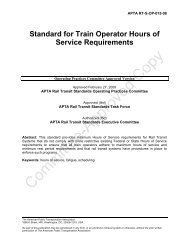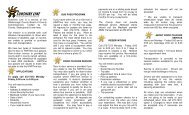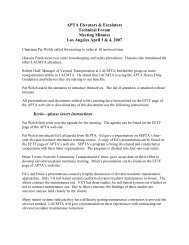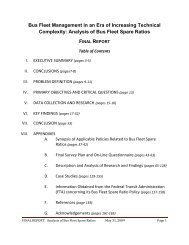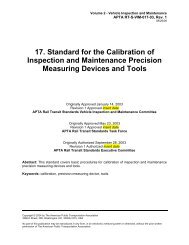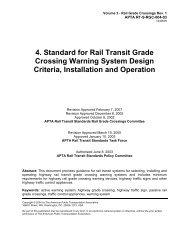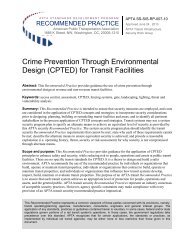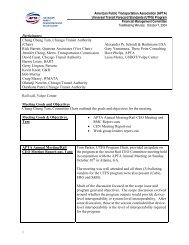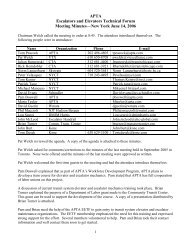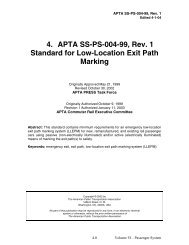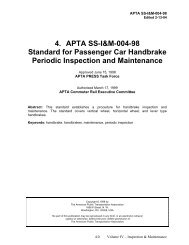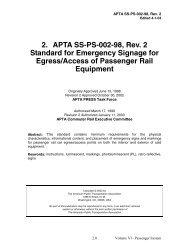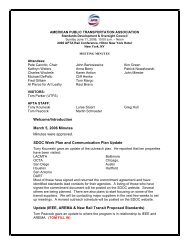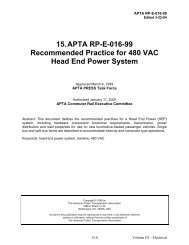Standard Bus Procurement Guidelines - APTAStandards.com
Standard Bus Procurement Guidelines - APTAStandards.com
Standard Bus Procurement Guidelines - APTAStandards.com
Create successful ePaper yourself
Turn your PDF publications into a flip-book with our unique Google optimized e-Paper software.
<strong>Standard</strong> <strong>Bus</strong> <strong>Procurement</strong> <strong>Guidelines</strong><br />
PREFACE<br />
Purpose<br />
The <strong>Standard</strong> <strong>Bus</strong> <strong>Procurement</strong> <strong>Guidelines</strong> (SBPG) are a model for solicitation of offers and contracts<br />
for the supply of transit buses. They are intended to be a starting point for a transit agency assembling<br />
a solicitation of offers and to assist in a cost-effective procurement. While the guidelines provide<br />
many options to the agency and the agency must, at a bare minimum, modify the guidelines to<br />
<strong>com</strong>ply with state law, adherence to the guidelines will facilitate <strong>com</strong>petitive offers from<br />
manufacturers, who are familiar with the guideline terms and conditions. In addition to the reliability<br />
of using a standard procurement tool, and the efficiency of manufacturers’ response to the<br />
solicitation, adherence to the guidelines will promote understanding and reduce the likelihood of<br />
disputes. In these ways, the SBPG are intended to promote the financial health of the bus<br />
manufacturing industry and the overall cost-effectiveness of urban bus transportation.<br />
History<br />
The SBPG are intended to supersede the Baseline Advanced Design Transit Coach Specification or<br />
“White Book,” which was developed 20 years earlier for the Federal Transit Administration (FTA).<br />
Published in April 1977, it was intended for use by FTA grantees to facilitate normal transit bus<br />
purchases and to establish production of Advanced Design <strong>Bus</strong>es (ADBs) through the use of a<br />
standard, <strong>com</strong>plete bus procurement package. The White Book was periodically updated by<br />
addendum for several years after original publication. In the late 1970s, FTA made the White Book a<br />
requirement for all federally-supported advanced design transit bus procurements. The requirement<br />
was lifted in the 1980s. Although the White Book was not formally updated for many years, a large<br />
number of transit authorities continued to use it for current bus procurements.<br />
In November 1993, the Executive Committee of the American Public Transit Association (APTA)<br />
established a <strong>Procurement</strong> Steering Committee, <strong>com</strong>prised of senior representatives of both transit<br />
operators and suppliers. At its initial meeting on January 13, 1994, the Steering Committee (attached)<br />
concluded that a <strong>com</strong>prehensive revision of both the procurement guidelines and the technical<br />
specifications contained in the White Book should be undertaken. FTA supported the project<br />
enthusiastically with a grant that funded the first edition of the SBPG and with technical assistance<br />
during development. The Steering Committee met in seven long, plenary conferences to reach<br />
consensus on a new document. Analysis and drafting between conferences was performed by KPMG<br />
Peat Marwick LLP in association with Booz Allen Hamilton, Inc. and Lea + Elliott, Inc. Parts 1<br />
(two alternative versions), 2, 3, and 4, consisting of the solicitation, general contractual provisions,<br />
quality assurance provisions, and warranty provisions were <strong>com</strong>pleted on May 1, 1996.<br />
Upon the <strong>com</strong>pletion of the new parts 1, 2, 3, and 4, constituting the <strong>com</strong>mercial terms and conditions<br />
of the SBPG, Federal Transit Administrator Gordon Linton issued a letter of support and<br />
endorsement, a copy of which immediately follows this preface.<br />
Preface ii<br />
3/31/97



